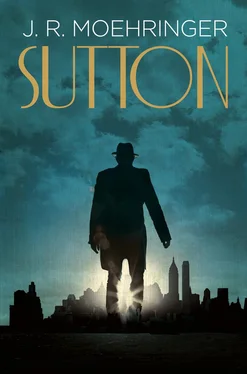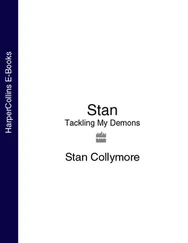WORD IS LEAKING OUT. BY NOON A DOZEN PRINT REPORTERS HAVE ALREADY arrived and they’re huddled at the front entrance, stomping their feet, blowing on their hands. One of them says he just heard—snow on the way. Lots of it. Nine inches at least.
They all groan.
Too cold to snow, says the veteran in the group, an old wire service warhorse in suspenders and black orthopedic shoes. He’s been with UPI since the Scopes trial. He blows a gob of spit onto the frozen ground and scowls up at the clouds, then at the main guard tower, which looks to some like the new Sleeping Beauty’s Castle in Disneyland.
Too cold to stand out here , says the reporter from the New York Post . He mumbles something disparaging about the warden, who’s refused three times to let the media inside the prison. The reporters could be drinking hot coffee right now. They could be using the phones, making last-minute plans for Christmas. Instead the warden is trying to prove some kind of point. Why, they all ask, why?
Because the warden’s a prick, says the reporter from Time , that’s why.
The reporter from Look holds his thumb and forefinger an inch apart. Give a bureaucrat this much power, he says, and watch out. Stand back.
Not just bureaucrats, says the reporter from The New York Times. All bosses eventually become fascists. Human nature.
The reporters trade horror stories about their bosses, their editors, the miserable dimwits who gave them this god-awful assignment. There’s a brand-new journalistic term, appropriated just this year from the war in Asia, frequently applied to assignments like this, assignments where you wait with the herd, usually outdoors, exposed to the elements, knowing full well you’re not going to get anything good, certainly not anything the rest of the herd won’t get. The term is clusterfuck . Every reporter gets caught in a clusterfuck now and then, it’s part of the job, but a clusterfuck on Christmas Eve? Outside Attica Correctional Facility? Not cool, says the reporter from the Village Voice . Not cool.
The reporters feel especially hostile toward that boss of all bosses, Governor Nelson Rockefeller. He of the Buddy Holly glasses and the chronic indecision. Governor Hamlet, says the reporter from UPI, smirking at the walls. Is he going to do this thing or not?
He yells at Sleeping Beauty’s Castle: Shit or get off the pot, Nelson! Defecate or abdicate!
The reporters nod, grumble, nod. Like the prisoners on the other side of this thirty-foot wall, they grow restless. The prisoners want out, the reporters want in, and both groups blame the Man. Cold, tired, angry, ostracized by society, both groups are close to rioting. Both fail to notice the beautiful moon slowly rising above the prison.
It’s full.
THE GUARDS LEAD SUTTON FROM HIS CELL IN D BLOCK THROUGH A barred door, down a tunnel and into Attica’s central checkpoint—what prisoners call Times Square—which leads to all cell blocks and offices. From Times Square the guards take Sutton down to the deputy warden’s office. It’s the second time this month that Sutton has been called before the dep. Last week it was to learn that his parole request was denied—a devastating blow. Sutton and his lawyers had been so very confident. They’d won support from prominent judges, discovered loopholes in his convictions, collected letters from doctors vouching that Sutton was close to death. But the three-man parole board simply said no.
The dep is seated at his desk. He doesn’t bother looking up. Hello, Willie.
Hello sir.
Looks like we’re a go for liftoff.
Sir?
The dep waves a hand over the papers strewn across his desk. These are your walking papers. You’re being let out.
Sutton blinks, massages his leg. Let— out ? By who sir?
The dep looks up, sighs. Head of corrections. Or Rockefeller. Or both. Albany hasn’t decided how they want to sell this. The governor, being an ex-banker, isn’t sure he wants to put his name on it. But the head of corrections doesn’t want to overrule the parole board. Either way it looks like they’re letting you walk.
Walk sir? Why sir?
Fuck if I know. Fuck if I care.
When sir?
Tonight. If the phone will stop ringing and reporters will stop hounding me to let them turn my prison into their private rec room. If I can get these goddamn forms filled out.
Sutton stares at the dep. Then at the guards. Are they joking? They look serious.
The dep turns back to his papers. Godspeed, Willie.
The guards walk Sutton down to the prison tailor. Every man released from a New York State prison gets a release suit, a tradition that goes back at least a century. The last time Sutton got measured for a release suit, Calvin Coolidge was president.
Sutton stands before the tailor’s three-way mirror. A shock. He hasn’t stood before many mirrors in recent years and he can’t believe what he sees. That’s his round face, that’s his slicked gray hair, that’s his hated nose—too big, too broad, with different-size nostrils—and that’s the same large red bump on his eyelid, mentioned in every police report and FBI flyer since shortly after World War I. But that’s not him—it can’t be. Sutton has always prided himself on projecting a certain swagger, even in handcuffs. He’s always managed to look dapper, suave, even in prison grays. Now, sixty-eight years old, he sees in the three-way mirror that all the swagger, all the dapper and suave are gone. He’s a baggy-eyed stick figure. He looks like Felix the Cat. Even the pencil-thin mustache, once a source of pride, looks like the cartoon cat’s whiskers.
The tailor stands beside Sutton, wearing a green tape measure around his neck. An old Italian from the Bronx, with two front teeth the size of thimbles, he shakes a handful of buttons and coins in his pocket as he talks.
So they’re letting you out, Willie.
Looks like.
How long you been here?
Seventeen years.
How long since you had a new suit of clothes?
Oh. Twenty years. In the old days, when I was flush, I’d get all my suits custom-made. Silk shirts too. D’Andrea Brothers.
He still remembers the address: 587 Fifth Avenue. And the phone number. Murray Hill 5-5332.
Sure, Tailor says, D’Andrea, they did beautiful work. I still got one of their tuxes. Step up on the block.
Sutton steps up, grunts. A suit, he says. Jesus, I thought the next thing I’d be measured for would be a shroud.
I don’t do shrouds, Tailor says. No one gets to see your work.
Sutton frowns at the three reflected Tailors. It’s not enough to do nice work? People have to see it?
Tailor spreads his tape measure across Sutton’s shoulders, down his arm. Show me an artist, he says, who doesn’t want praise.
Sutton nods. I used to feel that way about my bank jobs.
Tailor looks at the triptych of reflected Suttons, winks at the middle one. He stretches the tape measure down Sutton’s bum leg. Inseam thirty, he announces. Jacket thirty-eight short.
I was a forty reg when I came in this joint. I ought to sue.
Tailor laughs softly, coughs. What color you want, Willie?
Anything but gray.
Black then. I’m glad they’re letting you out, Willie. You’ve paid your debt.
Forgive us our debts, Willie says, as we forgive our debtors.
Tailor crosses himself.
That from your novel? Right Guard asks.
Sutton and Tailor look at each other.
Tailor points a finger gun at Sutton. Merry Christmas, Willie.
Same to you, friend.
Sutton points a finger gun at Tailor, cocks the thumb hammer. Bang.
THE REPORTERS TALK ABOUT SEX AND MONEY AND CURRENT EVENTS. Altamont, that freaky concert where those four drugged-out hippies died—who’s to blame? Mick Jagger? The Hells Angels? Then they gossip about their more successful colleagues, starting with Norman Mailer. Not only is Mailer running for mayor of New York, but he just got one million dollars to write a book about the moon landing. Mailer—the guy writes history as fiction, fiction as history, and inserts himself into all of it. He plays by his own rules while his rule-bound colleagues get sent to Attica to freeze their balls off. Fuck Mailer, they all agree.
Читать дальше












